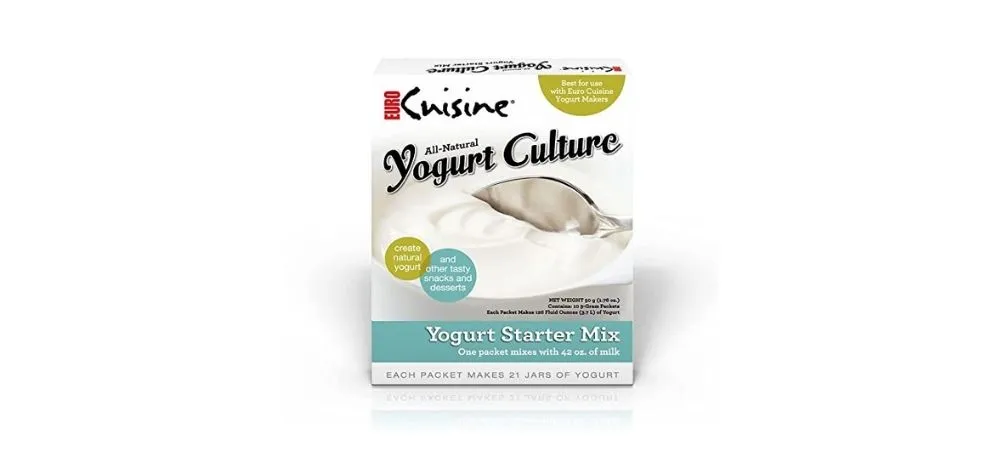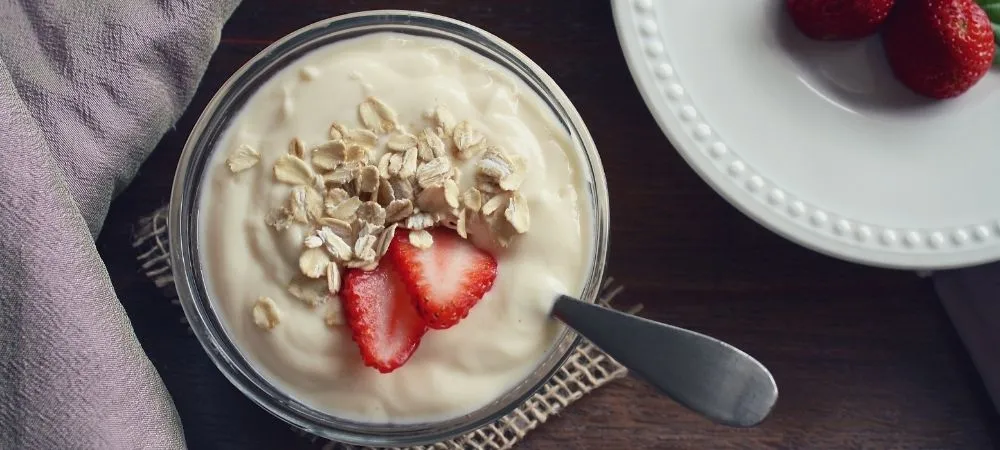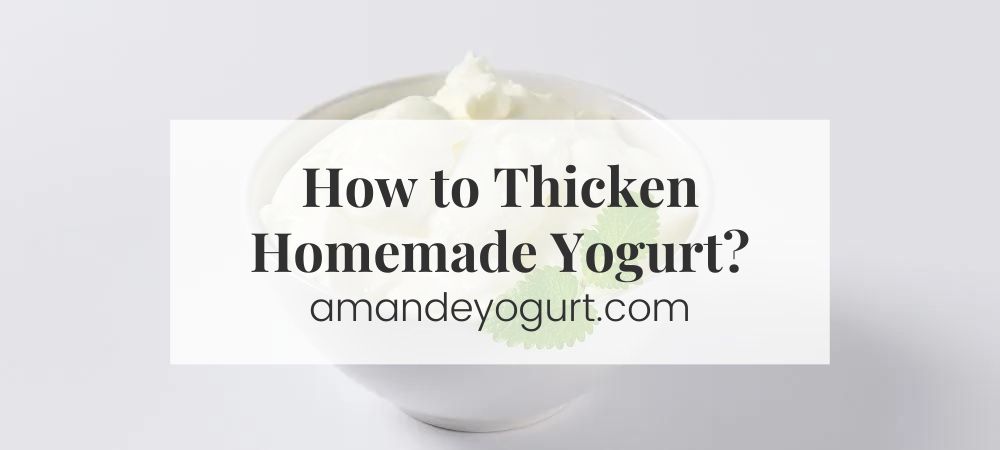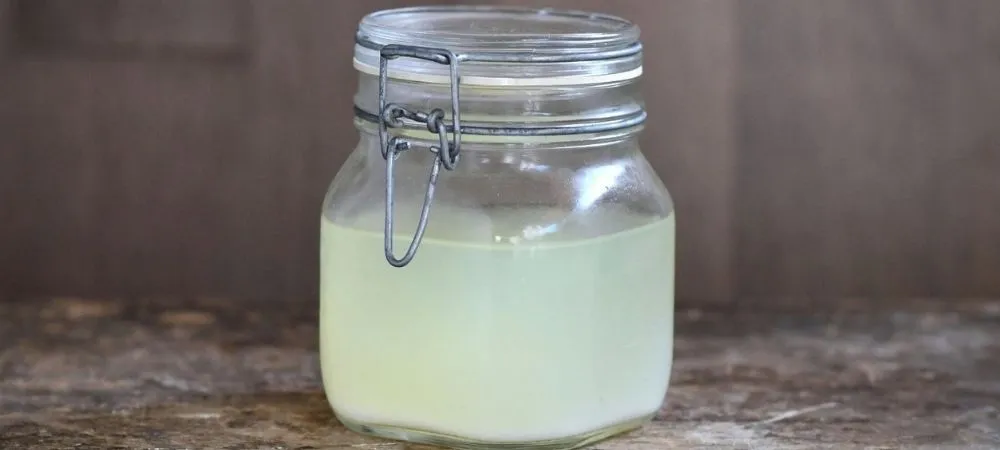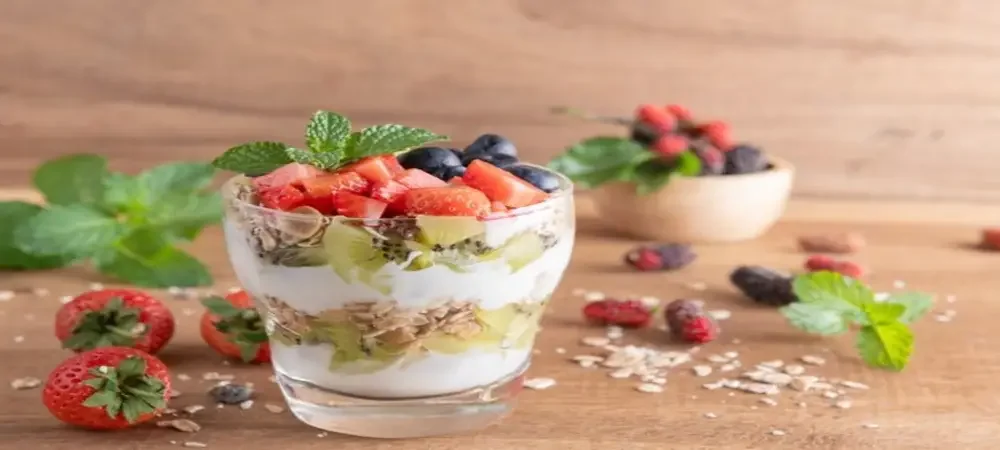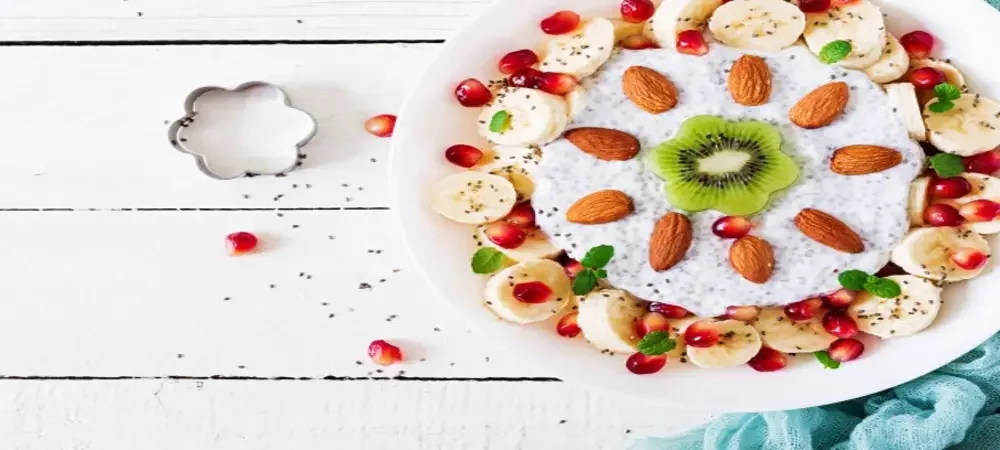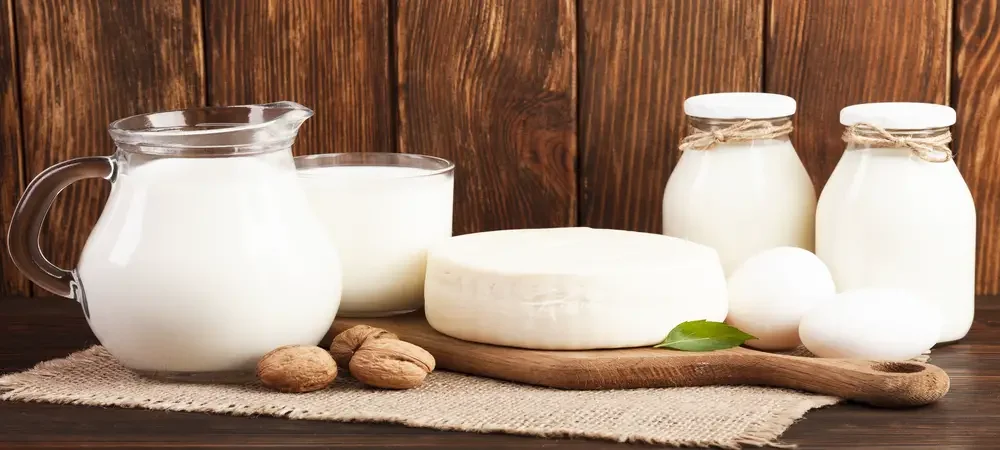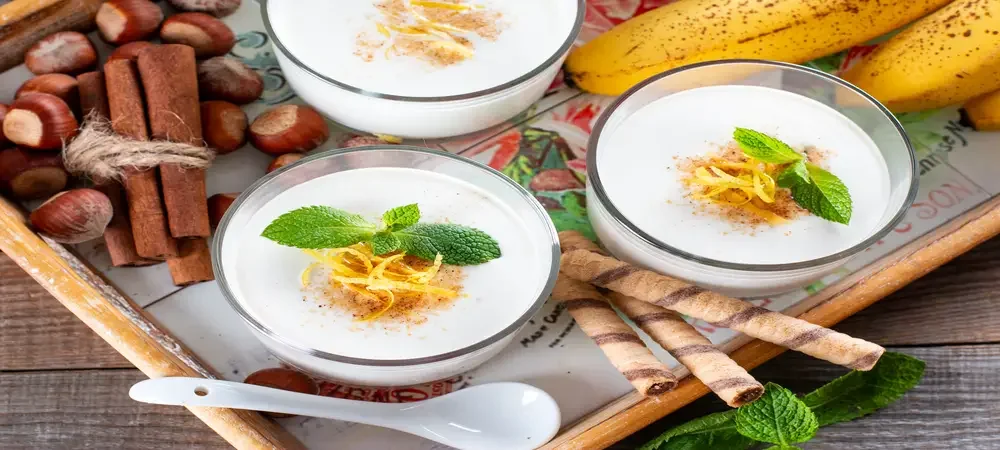Making yogurt at home can save you money because you don’t have to buy any expensive pre-made yogurts in the grocery store. Making your own yogurt is easy and gives you complete control over the ingredients.
If you’re wondering how to use a yogurt starter to make your yogurt, it’s pretty easy. This article will give you all the information you need to get started creating your homemade yogurt.
You can purchase yogurt starters online or in some stores that sell home-brewing equipment.
Yogurt starter or just plain yogurt are two names that are used interchangeably when speaking about the culture that aids in the fermentation of dairy.
This article will explore what it is and how to use it. Let’s get started.
What is a Yogurt Starter?
Yogurt starts with live cultures such as Lactobacillus bulgaricus & Streptococcus thermophilus.
These cultures are added to milk, and then the culture “eats” up all of the sugars in the milk (lactose), converting it into lactic acid. The lactic acid changes the milk’s composition, which allows it to ferment and thicken.
Yogurt is made by achieving the desired thickness, adding flavors, and packing it into containers. The yogurt culture provides the necessary enzymes to break down milk sugars for fermentation – so that’s where I would start if you were looking for a starter.
How to Use a Yogurt Starter?
The yogurt starter cultures are Streptococcus thermophilus and Lactobacillus delbrueckii subsp. bulgaricus bacteria is used to make the animal milk yogurt. These bacteria break down the milk proteins structure of milk and create a tangy and creamy yogurt.
Different combinations of the bacteria in a yogurt starter produce different types of milk. The tangy flavor of yogurt varies depending on the time and the fermentation process.
The quality and the type of milk you use also impact the texture of the final homemade yogurt. Pasteurized cow milk yogurt is thicker than raw milk or goat milk yogurt.
It is essential to follow the instructions specified for the chosen yogurt culture. Avoid adding more than recommended to level up probiotic strains in your milk. It may spoil the texture and taste of your yogurt.
Non-Dairy Milk Yogurt Fermentation
The starter culture consumes lactose in dairy-based yogurt at the time of fermentation. There is not enough natural sugar available in the non-dairy milk to feed the bacteria. To aid the fermentation of non-dairy milk, you can add some sugar, and preferably white sugar works better than the natural sugar options like maple or honey.
Probiotic Powder as a Starter Culture
A probiotic pill contains specific bacteria that multiply in yogurt. However, not all probiotic bacteria lead to tasty yogurt. Lactobacillus acidophilus, Streptococcus thermophilus, and Lactobacillus bulgaricus are significant bacterial strains that any probiotic must contain to make frozen yogurt.
Probiotic yogurt starters are loaded with gut-loving bacteria. As a starter culture, it produces a unique tart taste when added to milk.
Look for a multi-strain yogurt to get the best results. You can choose between probiotic powder and probiotic capsule. To use a yogurt starter culture, open the capsule and add the required dose to the milk.
On average, one probiotic capsule is enough for 4 cups of milk.
Freeze-Dried Bacteria Starter Culture
There are several yogurt starters available in the market and used for dairy and alternative milk. All these starter cultures vary in consistency and taste.
You can choose any yogurt starter culture if you have a specific dietary concern.
Top Yogurt Starter Culture: Reviews & Buying Guide
We have shortlisted the top 4 yogurt starter cultures that will make your yogurt-making journey a breeze:
1. Yogourmet Freeze-Dried Yogurt Starter: Best Budget
The numerable benefits of Homemade yogurt are known to everyone. Unlike store-bought yogurt, you can always control the ingredients of your yogurt when you prepare it at home.
This starter pack of Yogourmet Freeze-Dried Yogurt Starter comes with everything you need to get started, and the Yogourmet brand guarantees a delicious, healthy batch of yogurt every time. This kit contains all of the essential live cultures you need for a great-tasting yogurt with no additives or preservatives.
It is available in handy batch packs, so you can make as much or as little yogurt as you need. Ready to start making your yogurt? Pick up a Yogourmet Freeze-Dried Yogurt Starter today!
Pros
- Available in single pack with 16 packs in each box
- Skim milk culture for weight watchers
- contains multiple live cultures
Cons
- It contains sucrose which is not suitable for people with diet restrictions
2. Cultures For Health Greek Yogurt Starter
Are you looking for a healthier alternative to store-bought yogurt? Look no further than Cultures For Health Greek Yogurt Starter! This easy-to-use starter can help you make delicious, traditional Greek yogurt right at home – without any of the additives or preservatives found in commercial brands.
This product contains essential probiotics that help create the perfect greek style yogurt every time. Plus, it’s gluten-free – ideal for those with dietary restrictions. Use the Cultures for Health Greek Yogurt Starter to indulge in a healthy snack with ease.
So ditch the processed stuff and start making your healthy yogurts today!
Pros
- prepare yogurt from scratch
- contain probiotics for improved health
- compatible with various yogurt brands
Cons
- If you are lactose intolerant, avoid this yogurt starter
3. Greek Traditional Yogurt Kit: Best Greek Yogurt Starter
Greek yogurt has always been on the preference list of yogurt lovers for its unique taste and higher nutritional value. If you want to make this healthy retreat at home, consider the Greek Traditional Yogurt kit. Enjoy the authentic taste of Greek yogurt.
All you need is to add a packet of yogurt starter to 3 gallons of milk and let the bacteria take their magical course. Once the yogurt is set, take a cheesecloth to strain the yogurt (cheesecloth is included in the kit).
Pros
- contains calcium chloride
- Work better than other greek yogurt starters in the market
- value for money
- much appreciation from customers
Cons
- No noticeable cons.
4. Cultures For Health Vegan Yogurt Starter – Best Vegan Yogurt Culture
Looking for a fun and easy way to make vegan yogurt at home? Look no further than Cultures For Health Vegan Yogurt Starter! This unique blend of lactic acid bacteria is perfect for creating delicious dairy-free yogurt that’s smooth and mild in flavor. Plus, all of the ingredients are non-GMO and gluten-free!
This starter is suitable for non-dairy milk like cashew milk, soy milk, almond milk, etc.
Pros
- Affordable and easy to use
- loaded with six types of live active bacteria
- comes with the particular bend of lactic acid
- Gluten-free and GMO-free
Cons
- You have to add your thickness like pectin or guar guar
5. Cultures For Health Greek Yogurt Starter
If you are looking for a traditional yogurt starter, it is the best choice. Referring of why it is excellent for your health is the presence of probiotics in it, and it makes Greek yogurt from Scratch a superb option for health freaks.
You can use it with any yogurt maker to get the desired results. It is made from organic milk, and the clear instructions on its pack give you a detailed insight into making yogurt perfectly.
Enjoy the natural Greek Yogurt with an excellent taste.
Pros
- Top choice for health freaks and weight watchers
- Affordable
- Provide thicker consistency to your yogurt
- Produce great tasting yogurts
Cons
- People with existing digestive issues must avoid adding specific strains of Bacteria
Where can I buy starter culture?
You can buy the starter culture from stores or online.
What to look for when choosing your Yogurt Starter?
With an ample number of Yogurt Starter, choosing the right yogurt starter that meets your dietary restriction is essential. Millions of probiotic bacterias are present in these yogurt starters to culture milk.
Here are some of the basic things which one must consider while choosing a Yogurt starter:
Texture
Different textures of yogurt, as thin as drinkable yogurt, gelatinous or creamy, need another type of Yogurt starters. Greek yogurt is almost similar to plain yogurts in taste but is high in calories, proteins, and fat. If you use Greek yogurt cultures, you can expect a firmer texture.
Taste
Most of the yogurt is tangy in flavor due to the acidification of milk during fermentation. Depending on the bacteria you use to ferment yogurt, it may taste from astringent to sour. Longer the fermentation, tarter the yogurt.
Culturing temperatures
It is an important aspect of any starter culture. If the milk temperature is too hot, it may kill the bacteria cultures.
Two types of bacteria are generally found in most yogurt starter cultures – Mesophilic cultures and Thermophilic cultures. Thermophilic cultures result in firmer and thicker yogurt with a 5 to 12 hours fermentation time.
Mesophilic bacterias do not need warm milk and can culture the cold milk at room temperature in 12 to 88 hours of fermentation. The yogurt produced with Mesophilic bacterias is thin inconsistency.
Hair-loom bacteria cultures Vs. Direct-Set Cultures
Direct set bacterias can be added only to the one batch of yogurt. Only seasoned yogurt makers can re-culture the direct-set starter yogurt using a new powdered starter.
Hair-loom bacteria can be propagated indefinitely, i.e., each batch of yogurt can be used to culture the next batch of yogurt by using a small portion of it.
Which is the Best Yogurt Starter?
The best way to inoculate milk is to use the small quantities of existing yogurt as a starter culture. If you are using commercial yogurt brands, always consider the ingredient list to check the presence of requisite bacteria. Make sure that the yogurt you will use as a starter culture must contain live cultures. It must be free from additional flavorings.
Plain Greek Yogurt is the best choice for yogurt starter culture.
Homemade yogurt is an excellent option to prepare another batch of yogurt at home. Reserve 1/3 of the cup to inoculate the milk, and your next set of yogurt will be ready soon once the fermentation process completes.
Commerical yogurt should not be used as a Yogurt starter. The presence of gelling agents and stabilizers interfere with the culturing process.
For non-dairy milk, use a probiotic or dried bacteria starter culture.
Frequently Asked Questions
Are Yogurt Cultures Good For You?
Yes! Yogurt cultures contain probiotic and gut-friendly bacteria. Considering yogurt as a nutritious snack, the positive health effects of eating yogurt regularly include – weight management, improved gut health, and reduced risk of heart diseases.
Can Probiotics Be Used as a Yogurt Starter?
Yes, probiotics are yogurt starter cultures that are sold as starter cultures. One such example is Lactobacillus Bulgaricus. You must check the labels before finalizing any probiotic as a yogurt starter.
How Much Yogurt Starter to Use?
Suppose you want a creamier and smoother yogurt texture. In that case, we recommend you to use small portions of yogurt starter. 2 grams (1/3 of a teaspoon) of Bacillus Bulgaricus is enough for 2 liters of yogurt.
3 grams of starter is enough to make 4 liters of yogurt. If you use less than the recommended amount of starters, the fermentation process will take longer.
How Long Does Yogurt Culture Last?
Unopened packets of freeze-dried yogurt can last longer. Check the used by date to ensure it is good to go.
You can use the Heirloom starter culture indefinitely once activated. You can create new batches of yogurt and should consume in 7 days.
What Happens if You Use Too Much Yogurt Starter?
Too much yogurt starter will lead to inconsistent yogurt. When you add too much starter, the yogurt may turn sour.
Conclusion
You should store yogurt starter in the fridge between 2°C to 8°C. Never freeze yogurt starter as it might damage the bacteria cells, essential for fermenting milk into yogurt.
It is always wise to use small quantities of yogurt starter at first.
